Overview

As the end of the primary season draws near, Barack Obama is the clear favorite of Democratic voters for their party’s presidential nomination. He currently holds a wide 54% to 41% lead over Hillary Clinton. But when the Illinois Democrat is tested against John McCain in a general election matchup, he now runs about even against the presumptive Republican nominee. Previously, Obama had led McCain by modest margins in three Pew surveys conducted since late February.
Obama’s strong lead over Clinton reflects his more favorable image among voters. The balance of voter opinion about Obama has consistently been more positive than for Clinton. However, the tightening general election matchup between Obama and McCain shows some sullying of Obama’s personal image over the past three months, despite his primary victories. Over this period, unfavorable views of McCain have risen as well.
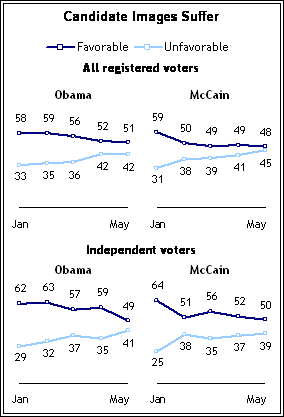
Obama’s favorable rating among voters has slipped eight points since late February, from 59% to 51% in the current survey. When those who express an unfavorable opinion are asked what they do not like about Obama, most (54%) cite his political beliefs. But nearly a third (32%) either mention the kind of person Obama is, or say their unfavorable views are influenced both by the kind of person he is and his political beliefs. White working class voters are among the most likely to mention the kind of person Obama is as a reason for their unfavorable opinion of him.
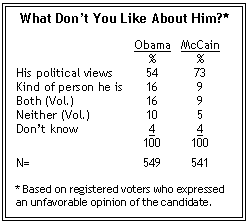
Obama’s slipping image is in some measure a negative reaction from frustrated Clinton supporters. Currently, just 46% of those who support Clinton for the nomination say the party will unite behind Obama if he is the nominee. In March, 58% of Clinton supporters said the party would rally behind Obama if he is the nominee.
Recent declines in Obama’s image have been pronounced among whites – especially white women. Currently, just 43% of white women express a positive opinion of Obama, down from 56% in late February.
Favorable opinions of Obama among independent voters, who have provided him strong support in several of his primary election victories, also have declined over the course of the campaign. Obama’s favorable ratings among this pivotal group have fallen from 62% in late February to just 49% in the current poll.
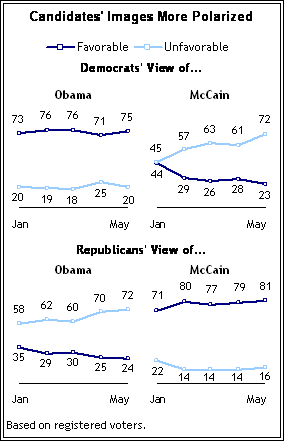
McCain’s personal image among voters also has become more negative since February. Currently, 48% express a favorable view of the Arizona senator while nearly as many (45%) have a negative opinion. In late February, the balance of opinion about McCain was more positive (50% favorable vs. 39% unfavorable). Unlike Obama, however, an overwhelming majority of those who express unfavorable views of McCain cite his political beliefs as the reason they do not like him, rather the kind of person he is. Fully 73% of those with a negative opinion of McCain cite his political beliefs while just 18% cite personal factors.
Most of McCain’s image decline is reflective of increasingly partisan opinions of the Arizona Republican. At the beginning of the year, Democrats were evenly split in their opinions of McCain, but now they are overwhelmingly negative (72% unfavorable). Republican views of McCain have improved markedly since the beginning of primary season. Like Obama, McCain also is less popular among independents than he was earlier in the year, though much of the decline in favorable views of McCain occurred between January and February.
These trends mirror shifting patterns of support for the candidates in the general election matchup. Currently, Obama and McCain run even among independents (44% to 44%); in April, Obama enjoyed a 52% to 41% advantage among these pivotal voters. Similarly, Obama now trails McCain among white women (by 49% to 41%), who were more evenly divided in previous surveys.
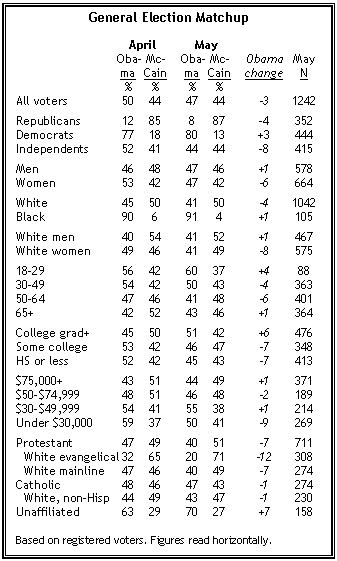
Obama’s diminished popularity and support among white women may in part be an indication of a growing backlash against him among Clinton’s women supporters. The survey finds that as many 39% of Clinton’s female supporters believe that her gender has hurt her candidacy. In turn, favorable opinions of Obama have tumbled among women who support Clinton – from 58% in March to 43% currently. By contrast, there has been a slight increase in positive views of Obama over this period among men who support Clinton (from 42% in March to 47% currently).
Beyond the changing personal evaluations of the likely nominees, the survey of 1,505 adults, conducted May 21-25, finds that each has clear advantages, and distinct liabilities, as the general election campaign approaches. For McCain, a positive sign is that a plurality of independents (47%) says that, if elected, he will take the country in a new direction, while 40% say he will continue President Bush’s policies. However, somewhat fewer independents expect McCain to depart from Bush’s policies than did so in March (52%).
Voters’ perceptions about whether McCain represents a break from Bush’s policies might change further in coming months as his positions on issues become clearer. Currently, just 34% of voters say they know a lot about where McCain stands on major issues; slightly more (39%) say they know a lot about the positions of Obama. This disparity is larger among the supporters of each candidate. A narrow majority of Obama backers (52%) say they know a lot about his positions on issues, while just 44% of McCain’s supporters say they know a great deal about their candidate’s positions.
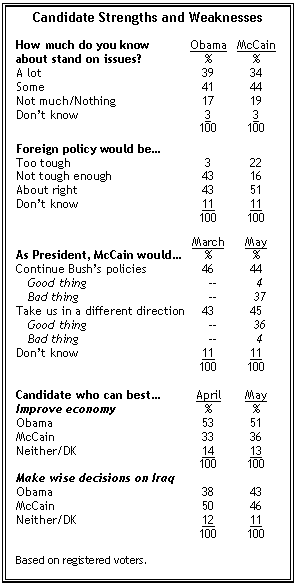
For Obama, one of the most striking positives in the survey is the extent to which his supporters in the general election test say they are voting for him rather than against McCain. Fully three-quarters of Obama supporters view their vote as being for Obama, while just 22% characterize their vote as anti-McCain. Four years ago, John Kerry’s support was more anti-Bush (50%) than affirmative support for Kerry (43%). Of McCain supporters, 64% say their vote is for him, while 32% say it is a vote against Obama.
Obama has a clear advantage over McCain on several major issues. In particular, voters say the Illinois Democrat could do better in improving economic conditions, dealing with the nation’s energy problems, and improving the healthcare system. Obama also is favored by 48% to 34% over McCain for reflecting voters’ views on social issues such as abortion and gay rights.
McCain tested somewhat better than Obama on dealing with immigration and taxes. However, nearly as many voters say Obama could do better in making wise decisions about what to do in Iraq as McCain (43% Obama vs. 46% McCain). Last month, the likely Republican nominee held a wide 50% to 38% margin on dealing with Iraq.
However, more voters continue to say that McCain is about right in his approach to foreign policy and national security issues than say that about Obama (51% vs. 43%). The view that Obama is not tough enough on foreign policy has not receded since earlier in the year. More than four-in-ten (43%) say that Obama is not tough enough on foreign policy, which is identical to February.
The survey finds that just 18% say they are satisfied with state of the nation – the lowest percentage in two decades of People-Press polls. Reflecting the widespread unhappiness with the national economy, an overwhelming proportion of respondents say the economy (88%) and jobs (78%) will be very important in their vote. In addition, roughly three-quarters each name healthcare, education, energy and Social Securi ty as very important.
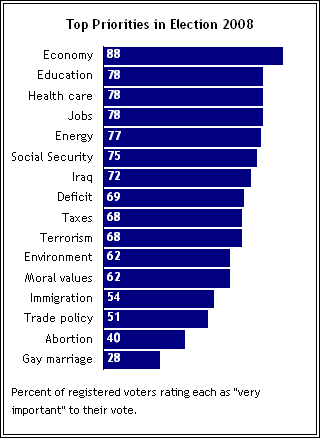
Concerns about energy have increased dramatically since the last presidential campaign. In October 2004, 54% said energy would be a very important issue in their vote; currently, 77% say energy is very important, which is greater than the percentages citing Iraq (72%) or terrorism (68%).
The survey was conducted shortly after the May 15 decision by the California Supreme Court overturning the state’s ban on gay marriage. Only about a quarter of voters (28%) now cite gay marriage as very important in their decision about who to vote for in the fall, which is slightly fewer than in October 2004 (32%).


